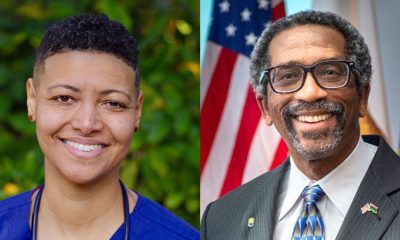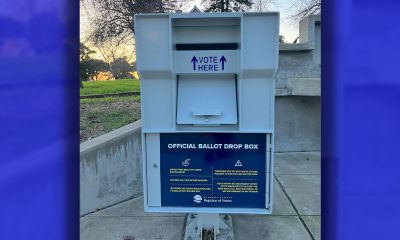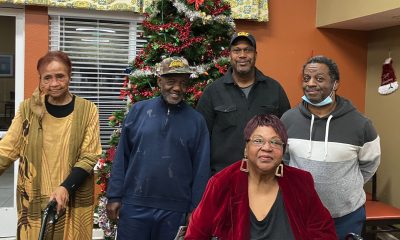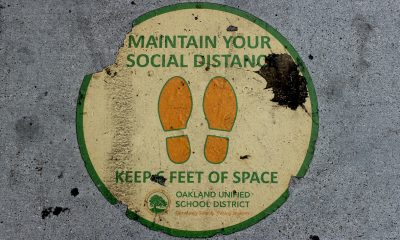Activism
The Community Democracy Project’s Campaign to Create a People’s Budget

The Community Democracy Project (CDP) is in the final stages of a signature gathering drive to place an amendment on next year’s ballot that, if approved, would vastly increase the role Oakland residents have in planning the city budget.
“This is about the politics of hope and real hope has to be grounded in our ability to take action,” said Shawn McDougal, who came up with the idea for CDP in 2011, the year of Occupy Oakland. “The politics our initiative represents are about we, the people, believing in our ability both as individuals and as a collective to make good choices about how our lives should run.”
CDP’s initiative aims to allow voters to vote on The People’s Budget Amendment which would amend and add to Oakland’s City Charter to allow those who live in Oakland to directly vote on how its budget dollars are allocated.
The plan would create neighborhood assemblies, which would be gatherings for people who live near each other to, as McDougal puts it, “connect their daily lives to the larger community.” They would meet at least ten times per year.
The amendment would also create citywide committees that would focus on specific departments and be comprised of delegates elected by neighborhood assemblies as well as representatives from appropriate city departments. The citywide committees would receive input from neighborhood assemblies to create budget proposals that would use city funds. Then, when the city budget is being planned, all eligible voters who have attended at least one neighborhood assembly could vote on the proposals which would determine how city funds would be allocated.
In addition to those typically allowed to vote in Oakland elections, CDP’s plan would allow undocumented residents and those over the age of 16 to vote on the city budget. Translation services would be provided for each neighborhood assembly that needs them.
“I talk to a lot of [undocumented] people who tell me they’ve been here 10 years, 20 years, 25 years, and they don’t have a say,” said Oakland native and CDP member Christopher J Chew. “Their kids play with our kids but they don’t get a voice. That’s the lack of respect we show each other in our current system; what we hope to build is trust for everyone to grow together.”
To get CDP’s proposal on the 2020 ballot, they need 15% of Oakland’s registered voters to sign their petition within a six-month time frame. That means gathering 36,767 signatures. They’ve had about 100 people gather some signatures for them and about 25 of them have gathered more than 100. They started the signature drive this summer as an all-volunteer project but soon found that they would need to expand to pay some workers who wanted to help with the campaign but would have been unable to without financial compensation. So Chew started the Cooperative 4 Community (C4C), which is a worker-owned cooperative that supports CDP in its signature-gathering campaign and also does teach-ins about issues related to CDP’s work.
Many of those involved with C4C are youth from Oakland. Their funding comes entirely from individual donations and a 15,000$ grant from Policy Advocates, the 501c4 arm of Oakland’s Sustainable Economies Law Center, a non-profit that supports cooperatives.
“It’s been great meeting all these people and trying to change Oakland for the better,” said C4C member Nick Paz. “Right now it’s pretty much the richest and loudest voices that get heard and affect change. We want everyone in Oakland to have a voice.”
Although CDP is close to getting all the signatures they need, they’re still working tirelessly for the final push as Dec 9th is the last date the petition is due.
“We need more volunteers and we need every Oakland voter who sees us out on the street, in front of your local supermarket or tabling at Lake Merrit, to sign our petition,” said CDP member Tia Taruc-Myers. “We only have two and a half weeks left, and if we don’t get the number we need, then even though we’ve already accomplished so much, we’re going to have to do it all over again.”
Readers who wish to learn more about CDP or to join their campaign can email communitydemocracyproject@
Activism
Oakland Post: Week of April 17 – 23, 2024
The printed Weekly Edition of the Oakland Post: Week of April 17 – 23, 2024

To enlarge your view of this issue, use the slider, magnifying glass icon or full page icon in the lower right corner of the browser window. ![]()
Activism
Oakland Schools Honor Fred Korematsu Day of Civil Liberties
Every Jan. 30, OUSD commemorates the legacy of Fred Korematsu, an Oakland native, a Castlemont High School graduate, and a national symbol of resistance, resilience, and justice. His defiant stand against racial injustice and his unwavering commitment to civil rights continue to inspire the local community and the nation. Tuesday was “Fred Korematsu Day of Civil Liberties and the Constitution” in the state of California and a growing number of states across the country.

By Post Staff
Every Jan. 30, OUSD commemorates the legacy of Fred Korematsu, an Oakland native, a Castlemont High School graduate, and a national symbol of resistance, resilience, and justice.
His defiant stand against racial injustice and his unwavering commitment to civil rights continue to inspire the local community and the nation. Tuesday was “Fred Korematsu Day of Civil Liberties and the Constitution” in the state of California and a growing number of states across the country.
One OUSD school is named in his honor: Fred T. Korematsu Discovery Academy (KDA) elementary in East Oakland.
Several years ago, founding KDA Principal Charles Wilson, in a video interview with anti-hate organization “Not In Our Town,” said, “We chose the name Fred Korematsu because we really felt like the attributes that he showed in his work are things that the children need to learn … that common people can stand up and make differences in a large number of people’s lives.”
Fred Korematsu was born in Oakland on Jan. 30, 1919. His parents ran a floral nursery business, and his upbringing in Oakland shaped his worldview. His belief in the importance of standing up for your rights and the rights of others, regardless of race or background, was the foundation for his activism against racial prejudice and for the rights of Japanese Americans during World War II.
At the start of the war, Korematsu was turned away from enlisting in the National Guard and the Coast Guard because of his race. He trained as a welder, working at the docks in Oakland, but was fired after the bombing of Pearl Harbor in 1941. Fear and prejudice led to federal Executive Order 9066, which forced more than 120,000 Japanese Americans out of their homes and neighborhoods and into remote internment camps.
The 23-year-old Korematsu resisted the order. He underwent cosmetic surgery and assumed a false identity, choosing freedom over unjust imprisonment. His later arrest and conviction sparked a legal battle that would challenge the foundation of civil liberties in America.
Korematsu’s fight culminated in the Supreme Court’s initial ruling against him in 1944. He spent years in a Utah internment camp with his family, followed by time living in Salt Lake City where he was dogged by racism.
In 1976, President Gerald Ford overturned Executive Order 9066. Seven years later, the 9th Circuit Court of Appeals in San Francisco vacated Korematsu’s conviction. He said in court, “I would like to see the government admit that they were wrong and do something about it so this will never happen again to any American citizen of any race, creed, or color.”
Korematsu’s dedication and determination established him as a national icon of civil rights and social justice. He advocated for justice with Rosa Parks. In 1998, President Bill Clinton gave him the Presidential Medal of Freedom saying, “In the long history of our country’s constant search for justice, some names of ordinary citizens stand for millions of souls … To that distinguished list, today we add the name of Fred Korematsu.”
After Sept. 11, 2001, Korematsu spoke out against hatred and discrimination, saying what happened to Japanese Americans should not happen to people of Middle Eastern descent.
Korematsu’s roots in Oakland and his education in OUSD are a source of great pride for the city, according to the school district. His most famous quote, which is on the Korematsu elementary school mural, is as relevant now as ever, “If you have the feeling that something is wrong, don’t be afraid to speak up.”
Activism
WOMEN IMPACTING THE CHURCH AND COMMUNITY
Juanita Matthews, better known as “Sister Teacher,” is a walking Bible scholar. She moved to California from the great state of Arkansas in 1971. Sister Teacher has a passion for teaching. She has been a member of Bible Fellowship Missionary Baptist Church since 1971.

Sister Juanita Matthews
55 Years with Oakland Public School District
The Teacher, Mother, Community Outreach Champion, And Child of God
Juanita Matthews, better known as “Sister Teacher,” is a walking Bible scholar. She moved to California from the great state of Arkansas in 1971. Sister Teacher has a passion for teaching. She has been a member of Bible Fellowship Missionary Baptist Church since 1971. She followed her passion for teaching, and in 1977 became the lead teacher for Adult Class #6. Her motto still today is “Once My Student, Always My Student”.
Beyond her remarkable love for the Lord, Sister Teacher has showcased her love for teaching by working for the Oakland Unified School District for 55 years, all but four of those years spent at Emerson Elementary and Child Development School. She truly cares about her students, making sure they have the tools/supplies needed to learn either at OUSD or Bible Fellowship Missionary Baptist Church.
She’s also had a “Clothes Closet Ministry” for 51 years, making sure her students have sufficient clothing for school. The Clothes Closet Ministry extends past her students, she has been clothing the community for over 50 years as well. She loves the Lord and is a servant on a mission. She is a loving mother to two beautiful children, Sandra and Andre. This is the impact this woman of God has on her church and the community.
-

 Activism4 weeks ago
Activism4 weeks agoOakland Post: Week of March 27 – April 2, 2024
-

 #NNPA BlackPress4 weeks ago
#NNPA BlackPress4 weeks agoCOMMENTARY: D.C. Crime Bill Fails to Address Root Causes of Violence and Incarceration
-

 #NNPA BlackPress4 weeks ago
#NNPA BlackPress4 weeks agoMayor, City Council President React to May 31 Closing of Birmingham-Southern College
-

 #NNPA BlackPress4 weeks ago
#NNPA BlackPress4 weeks agoBeloved Actor and Activist Louis Cameron Gossett Jr. Dies at 87
-

 Community1 week ago
Community1 week agoFinancial Assistance Bill for Descendants of Enslaved Persons to Help Them Purchase, Own, or Maintain a Home
-

 Activism3 weeks ago
Activism3 weeks agoOakland Post: Week of April 3 – 6, 2024
-

 Business1 week ago
Business1 week agoV.P. Kamala Harris: Americans With Criminal Records Will Soon Be Eligible for SBA Loans
-

 Activism2 weeks ago
Activism2 weeks agoOakland Post: Week of April 10 – 16, 2024
























































